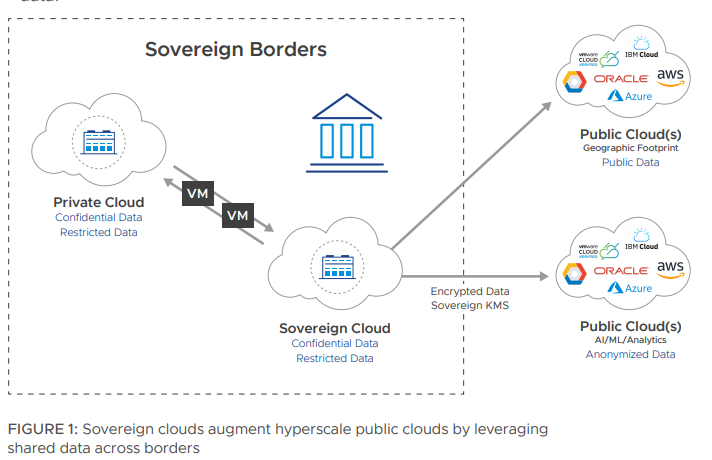
As data sovereignty gains more traction, the company has accumulated an ecosystem of 22 VMware Sovereign Cloud partners in the APJ region. (Photo by Josep LAGO / AFP)
VMware Sovereign Cloud gains momentum in APAC
- As data sovereignty gains more traction, VMware has accumulated an ecosystem of 22 Sovereign Cloud partners in the APJ region.
- More and more businesses are taking the need for sovereign cloud space seriously.
- Combining sovereign clouds into your multi-cloud approach can bring significant data security wins.
Since a substantial volume of sensitive data is now being stored in the cloud, the need for data sovereignty is gaining greater traction. In the Asia Pacific and Japan (APJ) region specifically, there’s a growing demand for data to be stored within national borders of the country that owns the data. VMware’s business growth in the region is proof of this demand. Today, the number of VMware Sovereign Cloud partners in the region has risen to 22.
“Countries and regions have started to create guardrails around data, and digital sovereignty to protect data,” VMware Asia Pacific & Japan’s senior VP and general manager, Sylvain Cazard told reporters during the company’s Singapore edition of its Explore event last week. The 22 VMware Sovereign Cloud partners are from key regional countries, including Singapore, Malaysia, Thailand, Indonesia, Australia, and New Zealand.

Sovereign Cloud embodies the need for national data borders.
Sovereign clouds are designed and built to deliver security and data access that meets the strict requirements of regulated industries and local laws on data privacy, access, and control. They protect critical data for both private and public sector organizations. VMware observed that countries across Asia need to intensify their efforts to develop data governance strategies and legislation to enforce laws focused on privacy, protection, and security.
That has prompted technology providers like VMware to strengthen their offerings of sovereign cloud capabilities in the region. According to Cazard’s discussions with customers, another factor boosting the demand for sovereign clouds in the region has been the necessity to mitigate risks and ensure uninterrupted business operations in an unpredictable and unstable global environment.
“In our region, Brunei, China, and Indonesia all have strict requirements that data must be stored on servers within the country. India and Malaysia have localization regulations that apply to certain domain names and around consent requirements before transferring personal data across borders. In Australia and New Zealand, data localization regulations apply to certain industries,” Cazard said in a media briefing at VMware Explore Singapore.
VMware’s Sovereign Cloud program was opened to partners in Asia-Pacific in October 2021. So far, regional partners include Malaysia’s Credence, AIS Business and Cloud HM in Thailand, Lintasarta in Indonesia, New Zealand and Australia’s CCL, Datacom, and Macquarie Cloud Services.
How does VMware’s Sovereign Cloud work?
Until recently, cloud providers ensured data sovereignty through contractual clauses that covered various aspects of the data lifecycle. While large enterprises have dedicated departments to handle these matters, smaller organizations may need more financial resources to manage the associated complexities or in-house expertise to comprehend the risks and benefits of data sovereignty fully.

While keeping data ‘in’ is a key concern for sovereignty, it is also necessary to
securely share data outside of its jurisdiction when warranted. Source: VMware
This is where VMware’s Sovereign Cloud initiative comes in to simplify and streamline the process of achieving cloud sovereignty. The company offers certified cloud solutions through partnerships with cloud providers. There are specific guidelines that must be adhered to for a cloud provider to attain certification.
These VMware Sovereign Cloud providers must also meet relevant geographic-specific requirements, regulations, and standards in the regions where their sovereign cloud services are offered. There are currently 53 VMware Sovereign Cloud providers.
Moreover, in the Worldwide Data and Content Technologies 2023 Predictions – APEJ Implications report, IDC predicts that by 2025, 30% of the 2000 Asia-based organizations (A2000) will move 10% of their workloads to a sovereign cloud provider to address data, technical, and operational requirements.
Integrating sovereign cloud into a multi-cloud strategy
The shift toward a multi-cloud approach, where businesses utilize multiple cloud service providers instead of just one, offers advantages to enterprises. However, it also raises the risk that data may inadvertently cross into regions governed by different data sovereignty regulations.
At a briefing during VMware Explore Singapore, senior VP Purnima Padmanabhan and VP Prashanth Shenoy explained how, by integrating sovereign cloud into a multi-cloud strategy, organizations could benefit from increased flexibility by avoiding vendor lock-in and future-proofing its data operations.
Padmanabhan said organizations should also consider sovereign clouds to complement their deployments on public or hyperscale clouds. This helps them take advantage of the breadth of services on offer across clouds. For example, the data on a sovereign cloud can be transferred to a public cloud to take advantage of its sophisticated analytics services, while ensuring adequate security measures are in place to protect the analytics outcome.
Shenoy also highlighted how, since all data is different, the right data must be deployed in the right cloud in a multi-cloud environment. “Here, the sovereign cloud plays an integral role, by enabling enterprises to manage critical data in a dynamic geopolitical landscape innovatively,” he said.
READ MORE
- Data Strategies That Dictate Legacy Overhaul Methods for Established Banks
- Securing Data: A Guide to Navigating Australian Privacy Regulations
- Ethical Threads: Transforming Fashion with Trust and Transparency
- Top 5 Drivers Shaping IT Budgets This Financial Year
- Beyond Connectivity: How Wireless Site Surveys Enhance Tomorrow’s Business Network




